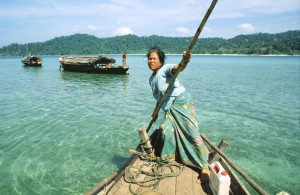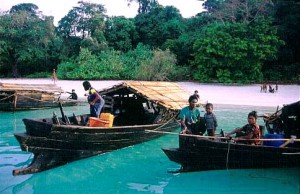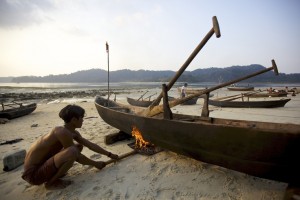The Moken are a group of nomadic peoples living off the coast of Thailand and Burma. They have had little contact with the outside world, and as such, their language has developed without much influence from other cultures…
Nomads of the Pacific Seas
 The Moken, a group of nomadic people who live in islands off the coast of Thailand and Burma, may be one of the few ethnic groups that until recently had little or no contact with the outside world. Also known as “sea gypsies”, the majority live in houseboats and are dependent on the sea for their livelihood as well as their sustenance. Most Moken learn to swim before they can walk, spending equal time under and above water.
The Moken, a group of nomadic people who live in islands off the coast of Thailand and Burma, may be one of the few ethnic groups that until recently had little or no contact with the outside world. Also known as “sea gypsies”, the majority live in houseboats and are dependent on the sea for their livelihood as well as their sustenance. Most Moken learn to swim before they can walk, spending equal time under and above water.
Along with their oral tradition of storytelling, it was this relationship with the sea that gave them the ability to predict a tsunami and to safely reach higher ground. Prior to the tsunami in 2004 in Southeast Asia, they noticed a sudden and dramatic decline in the tide. Traditional stories of a laboon, a ‘wave that consumes people’, warn that when the sea begins to retreat in such a way, the laboon is soon to follow.
The Moken Language

The people refer to themselves as Mawken or Moken, and they are called Selung or Salon by the Burmese. The language has approximately 7,000 speakers, and six dialects: Dung, Jait, Lebi, Niawi, Jadiak and Moklen. The written form of Moken is found in Karen, Latin and Thai scripts. The rate of illiteracy among the Moken is high, and this is increasingly problematic as they assimilate into the mainstream culture on the mainland.
No Word for Worry or Want

Theirs is said to be a very different perception of time, thus eliminating the need for words such as “when”. As mentioned previously, there is no word equivalent for “want” in Moken, and this is reflected in their culture of day-to-day survival that is entirely dependent on the generosity of the sea. Although it is most likely untrue that the Moken never worry, the fact that there is no word for “worry” tells us something about our own culture.
Is Moken Becoming Extinct?

Having moved to places where Moken is not the primary language, many no longer follow their traditional migratory lifestyle, which has pushed the language to the brink of extinction. The Moken who predicted the 2004 tsunami persevered, but can these “sea gypsies” survive the waves of modernity?
About Language Connections:
Language Connections is one of the top language service companies in the US. Over the last 30 years, we’ve focused on providing the best business translation services, interpreting services, as well as interpreter training and customized language training programs. In addition to top-tier corporate language training, we offer certified corporate interpreters and professional business translation services in 200+ languages. Our network includes linguists with backgrounds in all major industries. They’re ready to meet your needs, whether they’re for technical translation services, legal translation, government translation services, international development translation services, education translation services, life sciences translation, or something else. Reach out to us today for a free quote on our cost-efficient and timely translation services, interpreters, or other linguistic services.
Language Connections Inc.
2001 Beacon Street, Suite 105,
Boston, MA 02135
Phone: +1-617-731-3510
Email: service@languageconnections.com


